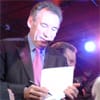However, the murmurs of approval and the bursts of applause that punctuated his speech suggested that François Bayrou was successful in reaching the audience by staying close to the practical issues and concerns of the average French citizen.
Praising the deputy’s tenacity, he in turn expressed his wishes before outlining the state of the country. A situation that UDF deputy described as serious, demanding reflection on solutions.
“It’s the end of a twenty-five-year cycle,” proclaimed François Bayrou, “and the beginning of another. I would not want the page that we are about to turn to resemble the one we are turning!”
Repeatedly, François Bayrou emphasized his desire to return power to the citizens, to restore the honor of the republic and democracy, and to resort to referendums on fundamental issues (such as pensions).
With a call for national unity to “make France win,” to move away from the polarization that leads to stagnation.
At the heart of François Bayrou’s priorities: debt, exclusion, education
The first commitment of candidate Bayrou is to emphatically highlight France’s debt, a debt that has increased over the past five years and now amounts to one thousand one hundred fifty-seven billion euros! Income tax barely covers the interest, which François Bayrou finds unacceptable: “A country that impoverishes itself is slowly suffocating.” He adds that it will take a lot of courage and pedagogy for a politician to change things. His proposal is to enshrine in the constitution, if elected, the prohibition for a government to present an operating deficit budget. Debt is one of the evils of France that François Bayrou wants to tackle, as is exclusion, which he speaks about very close to reality with strength and emotion: “I do not like it when those who have failed are pointed at and held responsible for their own failures!”… “(The recipients of minimum integration income) are our neighbors, our brothers… we are not done with them with just a handout” This is a national response that needs addressing, thanks to the associations and local authorities able to provide activities for the unemployed.
For national education, François Bayrou loudly proclaims his love for it and will make it his priority. “I am the only one… I don’t like it when people look for scapegoats. The school cannot repair all the weaknesses of the families,” the only raw material France has is the brain, the will, and the courage of its citizens. He also intends to mobilize all efforts to ensure that in all establishments, regardless of the neighborhood, school discipline and respect are maintained, and that all can accommodate exceptional paths. And to ensure peace reigns everywhere, François Bayrou proposes to remove disruptors who would benefit from tailored paths. He commits to ensuring the means, so that at each start of the school year “it is no longer a hunt for positions like duck hunting.” The school, but also research, the university, “in a pitiful state,” laments the presidential candidate; “we have brought it to the rest of the world… let’s move forward!”
On Europe, François Bayrou highlights the necessity to “build a Europe that the French understand and love,” analyzing in particular the reasons for the “no” due to a lack of clarification of an “incomprehensible” treaty.
Restoring an Honest Republic
This leads him to observe that democracy is not operating at full capacity. Examples include privatized highways, without voting. And François Bayrou wants to work on “restoring a democracy worthy of the name in which representatives play the role for which they are paid.” Adding that the rule of the European Parliament could be applied: deputies can vote (and are paid) only if they are present. But the deputies are not the only ones to blame, it’s mostly because they feel useless, he explains. He insists that politicians should force themselves to live like their constituents and to know the cost of living.
In conclusion, François Bayrou will express his creed:
A power exercised with sobriety and humility, an honest republic without mysterious lobbies, which does not favor friends. For this, the presidential candidate calls for unity, clearly positioning himself in the center, but admiring the values of the right as well as those of the left, claiming as much from a de Gaulle as from a Mendes France, calling for an end to the right-left war, and ready to work with all willing republicans.


